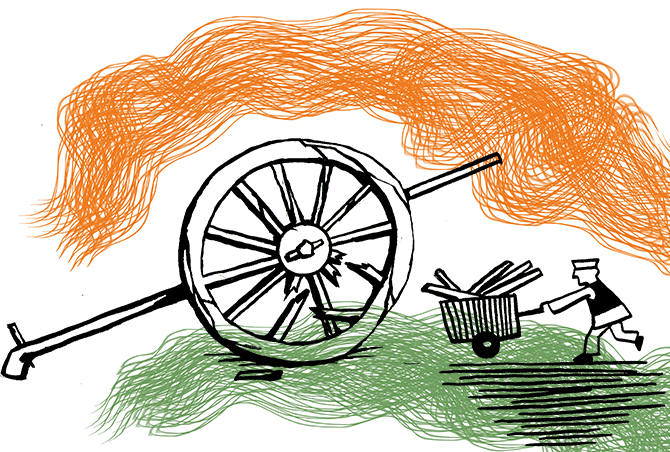Fitch Ratings has cut India's economic growth forecast to 8.7 per cent for the current fiscal but raised GDP growth projection for FY23 to 10 per cent, saying the second COVID-19 wave delayed rather than derail the economic recovery.

In its APAC Sovereign Credit Overview, Fitch Ratings said India's 'BBB-/Negative' sovereign rating "balances a still-strong medium-term growth outlook and external resilience from solid foreign- reserve buffers, against high public debt, a weak financial sector and some lagging structural factors".
The 'Negative' outlook, it said, reflects uncertainty over the debt trajectory following the sharp deterioration in India's public finances due to the pandemic shock.
Fitch said it has further lowered India's GDP forecast for the fiscal year ending March 2022 (FY22) to 8.7 per cent from 10 per cent in June as a result of the severe second virus wave.
It had in June cut the growth forecast from 12.8 per cent.
The projections for 2021-22 fiscal compares to a contraction of 7.3 per cent recorded in the last financial year and a 4 per cent growth in 2019-20.
"In our view, however, the impact of the second wave was to delay rather than derail India's economic recovery, reflected in an upward revision of our FY23 (April 2022-March 2023) GDP forecast to 10 per cent from 8.5 per cent in June," it said.
High-frequency indicators point to a strong rebound in the second quarter of the current fiscal (April 2021-March 2022), as business activity has again returned to pre-pandemic levels.
Fitch, however, saw a wider fiscal deficit.
"We forecast a 7.2 per cent of GDP (excluding disinvestment) central government deficit in FY 22," it said.
The government on June 28 this year announced a fiscal package worth about 2.7 per cent of GDP.
Much of this consists of loan guarantees, with only 0.6 per cent of GDP in higher on budget spending.
"However, buoyant revenue performance largely offsets the higher spending and should help contain the fiscal deficit," it said.
"Wider fiscal deficits and government plans for only a gradual consolidation put greater onus on India's ability to return to high GDP growth over the medium term to lower the debt ratio."
Inflation has hovered around the upper end of the Reserve Bank of India's (RBI) target inflation band of 2-6 per cent for the past several months, as commodity pressure raised prices.
The RBI has kept its repo rate at 4 per cent since March 2020, as it has focused on supporting the economy and regards the pressure as temporary.
"We expect inflation to moderate, which should allow the RBI to keep rates on hold until the next fiscal year," Fitch said.
Listing negative sensitivities, it said failure to reduce sufficiently the fiscal deficit to a level consistent with putting the general government debt/GDP ratio on a downward trajectory and a structurally weaker real GDP growth outlook due to continued financial sector weakness or reform implementation that is lacking.
On the positive side, implementation of a credible medium-term fiscal strategy to bring general government debt down after the pandemic towards the levels of 'BBB' category peers.
Also, higher sustained investment and growth rates in the medium term without the creation of macroeconomic imbalances, such as from successful structural reform implementation and a healthier financial sector.
The RBI too in July cut India's growth forecast to 9.5 per cent for this fiscal, from 10.5 per cent estimated earlier.
While S&P Global Ratings lowered its growth estimate to 9.5 per cent, another US-based rating agency Moody's has projected a 9.3 per cent growth in the current fiscal ending March 2022. For the 2021 calendar year, Moody's has cut the growth estimate sharply to 9.6 per cent.
In June, the World Bank slashed its GDP growth forecast for FY22 to 8.3 per cent, from 10.1 per cent estimated in April, saying the economic recovery is being hampered by the devastating second wave of coronavirus infections.
Domestic rating agency Icra last month had projected economic growth at 9 per cent for this financial year, while British brokerage firm Barclays had in May projected India's growth at 9.2 per cent.











 © 2025
© 2025